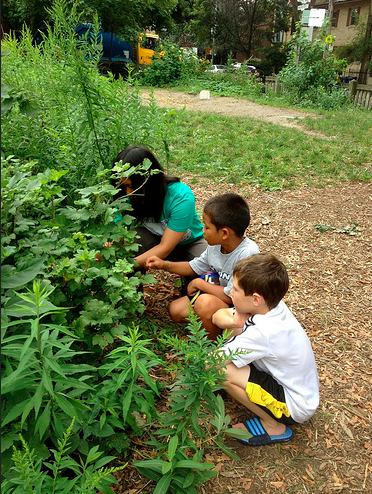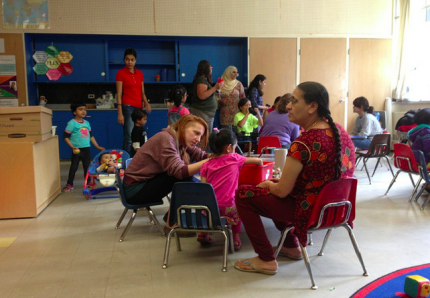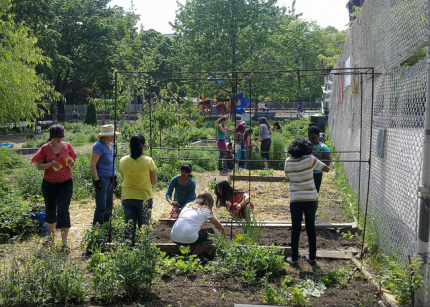Green Thumbs Growing Kids: Getting Kids “Hooked on Veggies”
Posted: November 28, 2014
Categories: Edible Education Network / Edible Education Project Profiles / News from Sustain Ontario
 Green Thumbs Growing Kids (GTGK) took root in 1999 as an after-school gardening and nature program for children aged 6-12, and founder Sunday Harrison saw it quickly grow into the successful learning school garden organization that it is today.
Green Thumbs Growing Kids (GTGK) took root in 1999 as an after-school gardening and nature program for children aged 6-12, and founder Sunday Harrison saw it quickly grow into the successful learning school garden organization that it is today.
“What brought me to this work,” Sunday shares, “was the idea that children need to have hands-on experiences with the outdoors and with food growing in order to stimulate their senses and connect to nature. I know how much it meant to me as a kid to have that, and how deadened the school environment was, compared to the woods, gardens and farms I was lucky enough to experience growing up.”
Sunday naturally wanted those experiences for her own kids, and knew many parents felt the same way, as childhood became increasingly screen-oriented. And so the seeds for Green Thumbs Growing Kids were planted, with the devoted mission to work with urban children, youth and their families to learn about, grow and prepare fresh foods, cultivated in an environmentally-sustainable manner through hands-on programming.
Their school-based programs are linked to the Ontario curriculum, with youth programs that run after school and throughout the summer, working to take care of school gardens (food produced in the school garden during the school year goes into lunch and snack programs)!
“I love to be outside, especially helping in the garden, because I am able to feel free and see nature,” one Grade 3 child shares.
It all began with the simple idea of connecting children to their food, providing kids with the tools to grow, harvest and enjoy food through interactive learning; this is certainly demonstrated in this great video from Regent Park TV, looking at GTGK Urban Roots Youth program in particular.
Lynn Nguyen, a youth participant in GTGK Urban Roots Youth program, got ‘hooked on veggies’ after participating in growing and harvesting school yard vegetables. Lynn explains, “I’ve probably eaten more veggies in the past 6 months than in the past 16 years. I know a lot more about organic food and healthy living and appreciate what’s on my table so much more now that I actually know how much work goes into growing food.”
“In the fall, for example, we were digging up the potatoes. Although it was loads of fun, it was hard: I get why they call it digging for gold, ‘cause once you dig up that first potato, it feels like you’ve just won the lottery! Supporting youth to become involved in gardening continues a historic practice that should not be forgotten. When the fruits of our labours were served at the fall Appreciation Evening for GTGK contributors, I could not have been more proud of the things the Urban Roots Youth accomplished together.”
We spoke with Sunday below about how she grew Green Thumbs Growing Kids from the ground up – check it out!
How is your program funded?
We have a mix of funding inputs – in 2013, the mix was 16% government, 11% foundations, 59% corporations, and individuals/members 14%.
How did you first engage the schools / communities? Who did you contact?
Each of our four elementary school partners has its own story – the partnerships developed organically over 14 years. They are all in the same general  geographic community, and the points of contact were generally teachers or parents, although in one case it was the head caretaker, an avid gardener, who helped get us into the school as a partner.
geographic community, and the points of contact were generally teachers or parents, although in one case it was the head caretaker, an avid gardener, who helped get us into the school as a partner.
What did you use to make your case for support?
1. Student nutrition, and the need to have hands-on experience with healthy foods, including opportunities to taste in the garden and then seeing those same foods in the lunchroom.
2. Hands-on environmental learning, particularly within the context of the Ecoschools program. When we started, there was not a whole lot of linkage, but for the last few years and currently, we are listed as a partner in the Ecoschools guide, and schools get points towards their Ecoschools certification for working with us.
What tips do you have for others doing this kind of initiative ?
Start small, and do it well, but not so small that you don’t raise energy and expectations. A single raised bed that can have a class gather around it is a good starting place. For tips on what to plant, please visit our website!
We have learned many lessons, and are still learning others, particularly in the fundraising department. Volunteers, particularly student interns from colleges and university programs that align with our mission, are really critical to our success. You need to be able to supervise them, though, and keep the learning community very healthy with lots of input of time and energy. We have good success with getting some of our staff through wage subsidies, particularly Canada Summer Jobs, and our municipal Social Services department has a wage subsidy for hiring an individual for a year.
We have grown our youth engagement program which was initially intended to support the elementary school gardens, and now have a fulsome after-school program for secondary-school aged youth. They have their own garden beds at the schools, and get paid an honorarium for weekend watering and other volunteering, outside of the program hours. They even sell their surplus produce at a local farmers’ market.
What was one of the biggest challenges you’ve come up against and how did you address it?
Space to operate has been a challenge. Making sure we have adequate storage for tools and culinary supplies in each garden… an ongoing challenge. Office space in our neighbourhood is extremely expensive.
We have been lucky to have free space for a time in a school portable, because of excellent relationships at that school and the keenness of the principal to have us onsite. However, enrollment at the school increased, and we’ve had to find alternative space. We’re now in the Centre for Social Innovation in Regent Park – which is an amazing community. However, it increases our costs, of course.
What factors were critical for your success?
Teacher and caretaker support has been critical. Principals’ support is wonderful, but teachers are the ones who actually respond to our invitation to bring their classes out to the garden. Caretakers are charged with looking after the grounds and facility so it’s extremely important that they are onside and will help us with water access and storage space where that’s applicable. Being sensitive around the union positions is important – this means no power tools in the garden, and no outside contractors for construction projects.
Parent support is also critical – many volunteer with their children’s classes, especially in the early years.
GTGK conducts a teacher survey every year or two to see where their impacts are in teachers’ minds, and where they can improve or add new programs. We shared a couple of youth quotes with you above, here’s a testimonial from a participating grade 3 teacher:
“At Rose Ave. PS, we are fortunate to have the opportunity to work in partnership with Green Thumbs… they provide our classes with outdoor hands-on workshops where children can learn about the inter-dependent nature of all living things (e.g., decomposters enrich our soil, while pollinators are integral to the survival of all). Our students learn first-hand about plant propagation, and perhaps encounter a freshly-dug potato for the first time in their lives! The workshops provided are relevant and engaging, and knowledgeable instructors work with teachers to deliver follow-up classroom activities, such as plant experiments or even cooking and eating what we’ve grown.
Green Thumbs continues to be an essential part of my science program, providing a successful and meaningful learning experience for my students.”
In 2013, 9 teachers completed a survey. 100% said that the value of their class experience was either Strong or Excellent (4 or 5 on a 5 point scale).
89% said the level of student engagement was either Strong or Excellent.
89% (8 out of 9) said they found it easy to incorporate the school garden into their curriculum.
78% (7 out of 9) said they would attend professional development related to the school garden.
67% (6 out of 9) said they noticed a positive change in the behaviour of students who participated in garden activities.
Contact:
Sunday Harrison
Green Thumbs Growing Kids, Founder
sunday@kidsgrowing.ca
info@kidsgrowing.ca
This profile is part of a series of profiles for the Ontario Edible Education Network.
Be sure to check out more profiles from the Network here!
2 responses to “Green Thumbs Growing Kids: Getting Kids “Hooked on Veggies””
Leave a Reply
You must be logged in to post a comment.


[…] Green Thumbs Growing Kids has some spectacular lesson plans on their website, with something for every elementary grade. The lessons are fantastic guides for connecting children to their food and demonstrating how our food grows, while outlining expectations, guidelines and materials for each lesson, as well as how it applies to the Ontario curriculum. […]
[…] Network for this exciting discussion on School Food Gardens. Sunday Harrison, Executive Director of Green Thumbs Growing Kids, has over a decade of experience helping gardens flourish in schoolyards throughout Toronto. Sunday […]